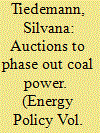| Srl | Item |
| 1 |
ID:
191224


|
|
|
|
|
| Summary/Abstract |
This study assesses the extent to which auctions for compensation payments are a suitable policy instrument for ending coal-fired power generation at minimum cost and thus achieving national climate targets. Germany is the first country to apply such a market-based mechanism. Evaluating the effectiveness and efficiency of the auction, we find that the first five of seven auction rounds will retire 10 GW of coal-fired capacity at a cost of 68 ± 5 EUR/kW, corresponding to an additional carbon price of 2.4 ± 0.2 EUR/tCO2. The possibility of administratively shutting down power plants from 2024 and a decreasing ceiling price have ensured that average compensation payments are well below the ceiling price, and low compared to other policies, even though there was no competition in two of five auction rounds. As the government cancels the freed emission allowances, the policy will result in lower emissions, even though the carbon intensity of the German coal power fleet increased slightly by 2%. Thus, the German auctions can serve as a model for national phase-out strategies in countries with similar institutional frameworks and provide a reference case for integrating conflicting policy objectives into auctions.
|
|
|
|
|
|
|
|
|
|
|
|
|
|
|
|
| 2 |
ID:
105818


|
|
|
|
|
| Publication |
2011.
|
| Summary/Abstract |
Hydrogen production via electrolysis has been proposed as a way of absorbing the fluctuating electricity generated by wind power, potentially allowing the use of cheap electricity at times when it would otherwise be in surplus. We show that large-scale adoption of electrolysers would change the shape of the load-duration curve for electricity, affecting the optimal capacity mix. Nuclear power stations will replace gas-fired power stations, as they are able to run for longer periods of time. Changes in the electricity capacity mix will be much greater than changes to the pattern of prices. The long-run supply price of hydrogen will thus tend to be insensitive to the amount produced.
|
|
|
|
|
|
|
|
|
|
|
|
|
|
|
|